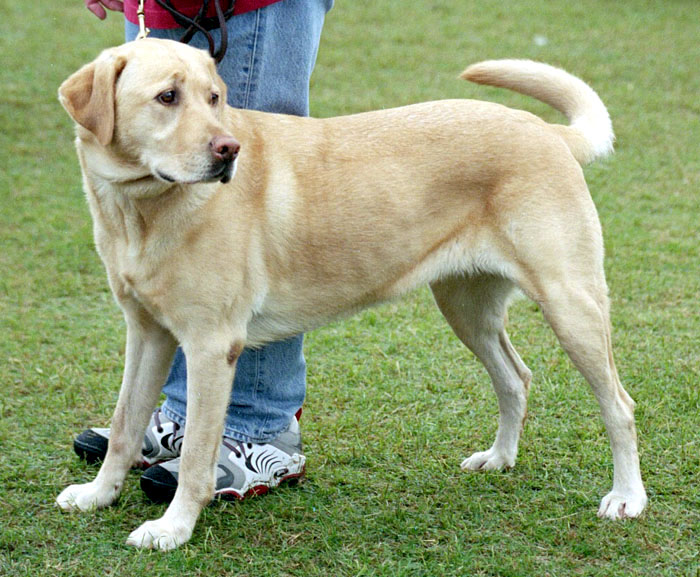dog

A dog (a Labrador retriever)
Meanings
Noun
- A mammal, Canis familiaris or Canis lupus familiaris, that has been domesticated for thousands of years, of highly variable appearance due to human breeding.
- Any member of the Family Canidae, including domestic dogs, wolves, coyotes, jackals, foxes, and their relatives ; canid.
- A male dog, wolf or fox, as opposed to a bitch or vixen.
- A dull, unattractive girl or woman.
- A man (derived from definition 2).
- A coward.
- Someone who is morally reprehensible.
- A sexually aggressive man.
- Any of various mechanical devices for holding, gripping, or fastening something, particularly with a tooth-like projection.
- A click or pallet adapted to engage the teeth of a ratchet-wheel, to restrain the back action; a click or pawl. (See also: ratchet, windlass)
- A metal support for logs in a fireplace.
- The eighteenth Lenormand card.
- A hot dog.
- Underdog.
- Foot.
- (from "dog and bone") Phone or mobile phone.
- One of the cones used to divide up a racetrack when training horses.
- Something that performs poorly.
Verb
- To pursue with the intent to catch.
- To follow in an annoying or harassing way.
- To fasten a hatch securely.
- To watch, or participate, in sexual activity in a public place.
- To intentionally restrict one's productivity as employee; to work at the slowest rate that goes unpunished.
- To criticize.
- To divide (a watch) with a comrade.
Related
Similar words
- taxonomic names: Canis familiaris, Canis domesticus, Canis familiarus domesticus, Canis canis, Canis aegyptius, Canis familiarus aegyptius, Canis melitaeus, Canis familiarus melitaeus, Canis molossus, Canis familiarus molossus, Canis saultor, Canis familiaris saultor
- stud, sire
- cad, bounder, blackguard, fool, hound, heel, scoundrel
- click, detent, pawl
- andiron, firedog, dogiron
Narrower meaning words
- Afghan hound
- bloodhound
- chihuahua
- coonhound
- dachshund
- deerhound
- foxhound
- gazehound
- German shepherd
- greyhound
- hound
- Irish wolfhound
- Norwegian elkhound
- otterhound
- pointer
- poodle
- retriever
- Russian wolfhound
- scenthound
- setter
- sheepdog
- shepherd
- sighthound
- spaniel
- staghound
- terrier
- wolfhound
Broader meaning words
Origin
- From Middle English dogge (whence also Scots dug ("dog")), from Old English dogga, docga, of uncertain origin.
- The original meaning seems to have been a common dog, as opposed to a well-bred one, or something like 'cur', and perhaps later came to be used for stocky dogs. Possibly a pet-form diminutive with suffix -ga (compare frocga, *picga), appended to a base *dog-, *doc- of unclear origin and meaning. One possibility is Old English dox (compare frocga from frox). Another proposal is that it derives from Proto-West Germanic *dugan ("to be suitable"), the origin of Old English dugan ("to be good, worthy, useful"), English dow, German taugen. The theory goes that it could have been an epithet for dogs, commonly used by children, meaning "good/useful animal."
- In 14th-century England, hound (from hund) was the general word for all domestic canines, and dog referred to a subtype resembling the modern mastiff and bulldog. By the 16th century, dog had become the general word, and hound had begun to refer only to breeds used for hunting. In the 16th century, the word dog was adopted by several continental European languages as their word for mastiff.
Modern English dictionary
Explore and search massive catalog of over 900,000 word meanings.
Word of the Day
Get a curated memorable word every day.
Challenge yourself
Level up your vocabulary by setting personal goals.
And much more
Try out Vedaist now.

